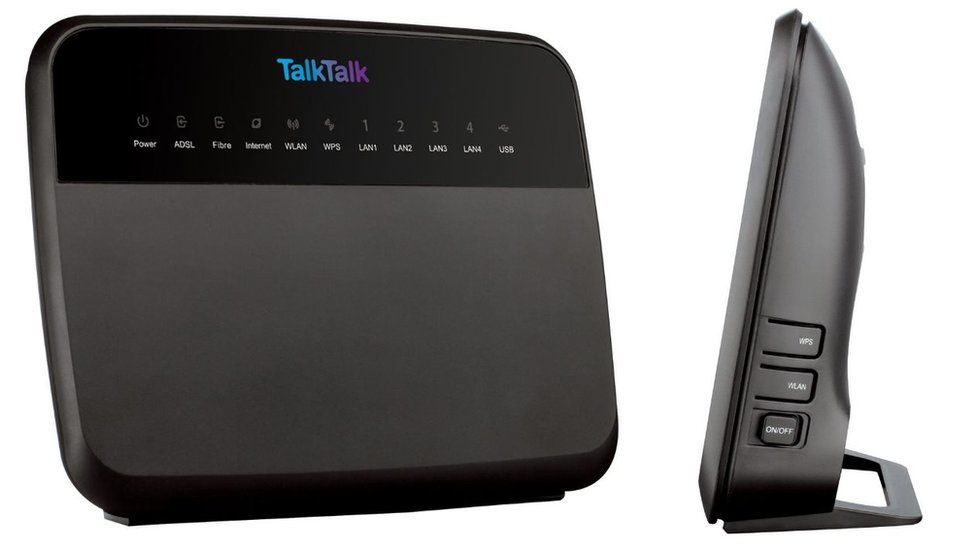TalkTalk wi-fi router passwords 'stolen'
- Published

TalkTalk customers' wi-fi passwords have been stolen following a malware attack that blocked their internet access last week, an expert has warned.
The researcher said other details had also been taken that would let attackers pinpoint where the equipment was being used, making more targeted hacks possible.
Pen Test Partners' Ken Munro wants thousands of routers to be replaced.
But TalkTalk said it had not seen evidence to confirm the thefts.
"As is widely known, the Mirai worm is affecting many ISPs [internet service providers] around the world and it has affected a small number of TalkTalk customers," a spokeswoman said.
"We continue to take steps to review any potential impacts and have deployed a variety of solutions to ensure customers' routers remain safe.
"We have also employed additional network-level controls to further protect our customers."
The BBC revealed last week that TalkTalk's D-Link DSL-3780 routers had been struck by malware causing connectivity issues for those customers using the model.
The firm subsequently published advice online telling affected users to reset the equipment - which forced it to install an update to protect itself against the attack - and then "use the wireless network name and password on the back of the router" to get back online.
Security researcher Mr Munro obtained one of the affected routers to study the attack.
He said his "honeypot" router was hit by the variant of Mirai, which is now being referred to as TR-06FAIL.
But in addition to the connectivity issue, Mr Munro detected that a follow-up attack involving the same malware caused the device to disclose its wi-fi password and Service Set Identifier (SSID) code.
An SSID code can be used to reveal where a machine is located via online tools such as Wigle.
As a consequence, he said, even after subscribers had restarted their routers they could remain at risk if they continued using the same password as before.
"Most consumers never change the wi-fi keys written on the back of their router, so the fix didn't actually fix the problem," Mr Munro explained.
"Once an attacker has got the wi-fi key, if they go near to the house they can get nearly everything from their home network.
"TalkTalk should seriously consider replacing customer routers immediately unless it can prove they haven't been compromised."
Encrypted communications - such as online banking records - would not be at risk. But emails might be and it would be possible to place malware on computers linked to an exposed network.
Mr Munro estimated that the recall would involve at least 55,000 routers.
TalkTalk's spokeswoman said it "firmly" disputed that number, saying the number of routers infected had been "nothing in that order of magnitude".
"Our security team does not believe there is any greater risk that a customer's wi-fi can be used or accessed without their permission as a result of this," she added.
But Mr Munro countered that some of the routers hit by the password-stealing attack might not have had their internet connectivity disrupted, despite the same vulnerability being exploited.
Password change
An independent researcher who checked the findings said Mr Munro had reason to be concerned, but added it was not clear who had scooped up the passwords.
"It's possible they are just security researchers, but also reasonably possible that they are actually criminals that intend to exploit this information," said Dr Steven Murdoch from University College London.
"Even if it's the latter, they would have to sit outside your house to do it."
Dr Murdoch said the risk was still high enough that TalkTalk needed to address it, but said there were alternatives to recalling the routers.
"The hardware is fine, what needs to be replaced is the wi-fi password.
"The problem is how to send a new password to all the affected customers.
"If TalkTalk does this online or over the phone, that leaves the customers open to phishing attacks, where a scammer says: 'As you heard on the news you need to change your password, please do these things...'"
TalkTalk's spokeswoman said some customers who had called in had been advised to change their wi-fi passwords, but the firm's security team now believed the step was unnecessary despite Mr Munro's warnings.
- Published1 December 2016
- Published28 November 2016